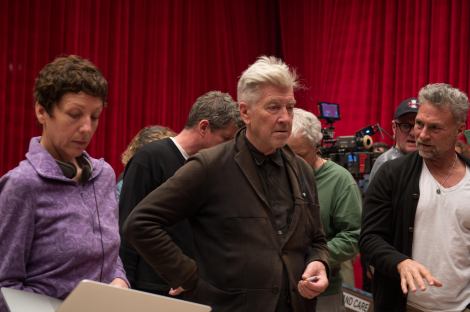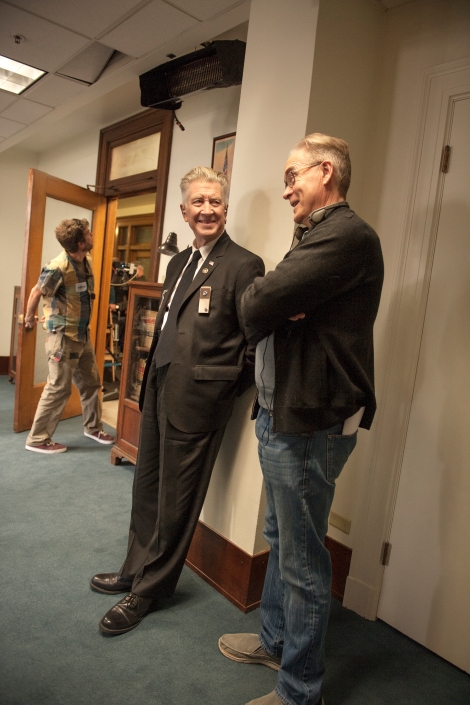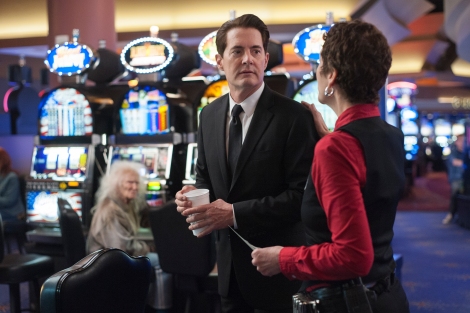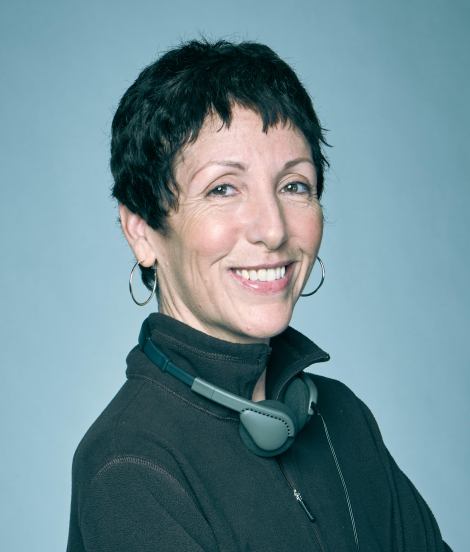
Sabrina S. Sutherland (left) with David Lynch. Courtesy Suzanne Tenner
Sabrina S. Sutherland is an award-winning producer whose work spans more than three decades in film, television, and commercials. Her acclaimed collaborations with director David Lynch include the ABC series Twin Peaks and the films Lost Highway and Inland Empire, among others. Her most recent feature is Gray House, a Grasshopper Films release from Austin Lynch and Matthew Booth now screening at theaters around the country.
As Showtime’s Twin Peaks: The Return celebrates nine Emmy Award nominations, Ms. Sutherland speaks with Sean L. Malin of CineMalin about David Lynch’s love of reality series, working together towards an all-encompassing vision, and the state of independent cinema today.
This interview has been lightly edited for clarity.
CineMalin: I take a certain pride as a critic in having worked in TV and film production for a long time, a lot of it akin to the work that you have done in this industry from bottom to top for many years. You are a factotum at this point.
Sabrina S. Sutherland: I have done a lot of things, and I did work my way up, so I feel that we absolutely are compatriots.
CM: What was your version of entry level when you started working?
SSS: My very, very first job was as a page at Paramount when they first launched that [program]. I did the tours and I answered the phone on the set of Webster. Then I became a Set PA on Webster.
CM: That was such an incredible period for Hollywood. Television was really evolving, and film was in the midst of this explosion. Having worked on Twin Peaks not that much later, you must be accustomed to people using the phrase “The Golden Age of Television” for that period. But really, when you were first starting was when TV was first getting deeply serious and deeply impactful. Is that fair to say?
SSS: [That was] maybe a little ahead of me, in the late ‘70s. That’s when they really started to do those socially conscious kinds of shows and started to become more serious. I started in ’84. The way television was done, I was at the tail end of it. Just like the old Hollywood system – the system with contract players and all that…Then there was the end of that, and then the independent actors came into film. Then it changed for the better. [Similarly] I think it’s only gotten better in television. A lot of what we did with Twin Peaks was really a film. Television is going more and more in that direction, which I appreciate, but it has taken a long time.
CM: I imagine you’ve been inundated over the last year and a half with all sorts of interpretations of your work, and academics trying to pick your brain. How versed are you in scholastic interpretations of TV now compared to when you were first starting in TV?
SSS: When I started out as a set PA, television was not what I wanted to do. My goal was to work in feature films. That was the thing. I love theory and I like to talk about film. I suppose I was always a little scholastic in that way because I really prefer the independent versions: the story, the filmmaker who makes his version of his film, kind of like an auteur but completely independent. The first thing that I worked on that was truly independent was a feature film I did as a set PA.
CM: What was the film?
SSS: I think it was released as Out Cold. It was called Stiffs originally. It was with John Lithgow, Teri Garr, Bruce McGill. It is a really great kind of dark comedy, very overlooked, but I thought it was so wonderful. And it was an independent film, so I loved being there from the very beginning to see how the producers put it together. Everything was just so independent about it. That was during the boom of independent film in the ‘80s.
CM: The best.
SSS: Yeah, I really appreciated that. I also worked on some studio films, but it just wasn’t the same. You really have to be inventive when you don’t have a lot of money, so you come up with great ideas. I see a lot of waste with studio pictures and with the way television is sometimes. We really did Twin Peaks [The Return] like an independent film – everything about it was independent. Even though Showtime was the distributor, we acted as our own company. I went to all the guilds and signed our company up. We got our own attorneys. We did everything independently and managed everything independently. That is my goal and my vision and where my thoughts are in terms of the moving picture, whether that be television or film.
CM: The borders are so porous now between film and TV in terms of how something gets created, produced, distributed, cast or envisioned – these worlds are so fluid and flexible. I worked with a producer once who was told by a network executive, in front of me, “We’re looking for feature film beauty on a basic cable budget.” That was such a funny way, I thought, to describe the vision they were looking for while also trying to eradicate the waste that you see in many so-called visionary films or shows, usually where one male creative gets to move forward without a clear sense of financial boundaries or any idea about whose money it is to use.
That’s the thing about your work with David Lynch: for better or for worse, the way I see it, there is rarely any excess. It is all integral to the creation of the work. With an 18-hour movie, you’d think that it would surely overload, but somehow, it all ends up working together. So much of that comes from your work running the set.
SSS: Well, hopefully. Ultimately, everything on the screen is David’s vision, and my job is to create that vision and help him create it, whether that’s finding a way to make what he wants to be up there happen, or finding the crew, or being able to negotiate things in a way to allow him to experiment and have that vision come to fruition. That can be difficult. But I think my job is to spend the money and put it up onscreen. That’s how I produce.
CM: Auteur theory often eradicates that. Not to discredit David Lynch, who is a wonderfully imaginative and creative person whose work is so distinctive and who creates his own material, but I feel that [calling him an auteur] eliminates the amazing collaborations which have informed his work throughout his whole life. Duwayne Dunham, for example, is so integral to the completion of David’s vision – that guy should be getting 50 interview requests a day and winning his honorary Oscar this year.
SSS: You bring up a perfect example because, in addition to Duwayne, we had several other editors, David included. The editing [of Twin Peaks] was not done in a traditional way. It was a completely collaborative experience. Nobody did any one episode. Each person had different things that they tackled. Duwayne then collected everything from the other editors (outside of David) and organized everything and made his pass. Then once the team of editors and Duwayne were done, David then spent another six months or whatever going through everything, reorganizing, and either just checking or reediting or editing something else that hadn’t even been done yet.
So, yes, I do give them credit – everything about this was a collaborative process. The crew could not have been better. I am so very disappointed that they are not recognized as being as wonderful as they really and truly are. They had a very difficult job, but everybody worked really hard, and they created some amazing things. Nobody would accept mediocrity. I can’t stress that enough.
But I will say, at the end of the day, going back through, David had his finger on everything. Ultimately, it was his vision on camera, in the editing bay, in the mixing room, making sure that the final strokes were his. It was a completely different process than anything else. I can tell you that no one has ever done television like this. It’s just bizarre.

Twin Peaks co-creators David Lynch (left) and Mark Frost. Courtesy Showtime
CM: Without naming names – and this will lead into the follow-up question – have you ever worked on a set with somebody who imagines themselves to be an independent auteur in the Lynch or Spike Lee or Sofia Coppola mold, but who is deluded about their own ability to keep their finger on the pulse of everything that’s happening in the film or the production, and it just isn’t clicking?
SSS: Absolutely.
CM: I have seen this a lot in people who are given a certain kind of financial power on set. By contrast, one of the things that is so spectacular about what you and David have done together – and I’m not just talking about Twin Peaks here, but also Inland Empire, or the commercials, or the Duran Duran video – there’s something about these productions that is so complete in their packaging.
It gets forgotten sometimes that “David Lynch”, the brand, can make many people so much money down the line. There are a lot of people who imagine themselves to be like that working in film and television now, and want the Executive Producer credit on a ten-episode miniseries that they direct entirely, and total creative freedom. But unlike with Twin Peaks: The Return, those people – and their projects – crap out.
SSS: This was a huge undertaking. It took a few years to do. But David just kept saying, “Concentrate on the donut – not the hole”, or “You worry about the action, not the fruits of the action. Don’t worry about how something is going to be received. You have a vision, so make something as true to that vision as you can, and be happy with that because when you’re happy with it, you’ll walk away. However people receive it, that’s how it is going to be. You are never going to please everybody, so if you set out to try to please people, you will always walk away disappointed”.
I think that is true: no matter how you look at Twin Peaks or I look at it, there are people who look at it and think, “It wasn’t nostalgic enough. They should have done it like it was originally”, or maybe “18 hours is too many!” There are always people who are dissatisfied with whatever you do. So you can never look at those people as your goals. You have to be true to yourself, and then whatever happens, happens.

Courtesy Showtime
CM: That may be true, but many of the things that you and David have made together are legacy investments which get purchased and shared by people like me all the time. David Lynch will eventually die – we will all eventually die – but when that happens, all your collaborations together will continue to be screened for a hundred years. The unsparing nature of his vision and yours has made his work timeless. In the public discourse and conversation about Twin Peaks, there hasn’t been enough discussion of the fact that what you made together will be around for our entire lifetimes.
SSS: I know what you mean, and it’s funny you say that. I was talking to [Twin Peaks cinematographer] Peter Deming the other night, and he always says [about Lynch’s movies] that they have a “6-year shelf life” before people start to recognize them. At some point in the future, people will turn around and say, “Wait a minute – we didn’t really look at this”. It may be that David has some kind of advanced knowledge, but his things do have longevity, and tend to be looked at at a later date in such favorable ways. This happens with almost all of his work, except maybe the original Twin Peaks. But Fire Walk With Me –
CM: Now, that’s hailed as a masterpiece.
SSS: But it wasn’t then. I have tried to figure out what it is because this is very interesting to me, too. I admire David as an artist and I feel that his work is art, and he stays true to that art. I know this latest Twin Peaks was very dense – just like a painting, it has these layers to it, and each person can interpret it differently. Because we didn’t do any teasers or trailers, nobody had any [idea] what to expect. They had to just experience it the first time.
So with that came a lot of unanswered questions and no answers given. When you have art or a film, or this particular TV show, that has these questions leftover, they make it much more viable and rich somehow, I feel. There’s something there that keeps me coming back.

Sabrina S. Sutherland as “Floor Attendant Jackie” with Dougie Jones (Kyle Maclachlan, Center). Courtesy Showtime
CM: Is it important to you as a producer to keep up with trends in television?
SSS: I don’t know about trends, but I do watch TV. David doesn’t except for true-crime reality shows or car shows, Forensic Files, things like that. But I do like to watch television, even if I don’t really keep up with trendy TV. I love mysteries like the ones on Netflix, which has tens of thousands of them. I watch some of the big shows and think, “Wow, this is really good”. Game of Thrones – amazing costumes, amazing production value, story, acting, everything. That’s a show that is obviously very complicated to do at that extreme a level, and I love it.
For me, those are just television, but I get such a different feeling about Twin Peaks than I do from regular television. I don’t know how to explain – maybe it is just my taste – but when I watch other shows, they just don’t stay with me, I don’t need to watch them again and again and again.
CM: In the 12 years since Inland Empire‘s release and Twin Peaks becoming an 18-hour film on Showtime, have you noticed a change in the kind of cinema that is now being made available on Netflix, on paid cable, or on Amazon? Have you seen growth in film on these new platforms that reminds you of the passion you had for the independent cinema that inspired you when you were first starting out?
SSS: For the most part, not really, but then again, I don’t know that I have looked. The whole landscape of feature filmmaking has changed, television has changed. After the independent films being made in the 80’s and then a little bit in the 90’s, the studios came in, and then they were the “independent” filmmakers.
You used to go to Sundance to see them, and even Slamdance, but it just became about competing for studios. Now you have these independent filmmakers who come out and just shoot their own films in their twenties and put them up on the internet. And they don’t really get seen as much.
But they can be brilliant, and they are out there – I have seen some. You’re probably going to say this is silly because I worked on it, but I was blown away by an independent film done by Austin Lynch – David’s son – and Matthew Booth called Gray House, which is just the most beautiful film. So anti-film, in a way. But it is the medium of film that makes it so beautiful.
It’s definitely an art film, and something that juxtaposes documentary and narrative film together to create more of an experience. I would love to see more of these kinds of films, and I know they are out there, but I am just at a point where I use the ten-hour, really interesting television shows like Twin Peaks as my film right now. Those really are the new independent film.

Courtesy Patrick Ecclesine
